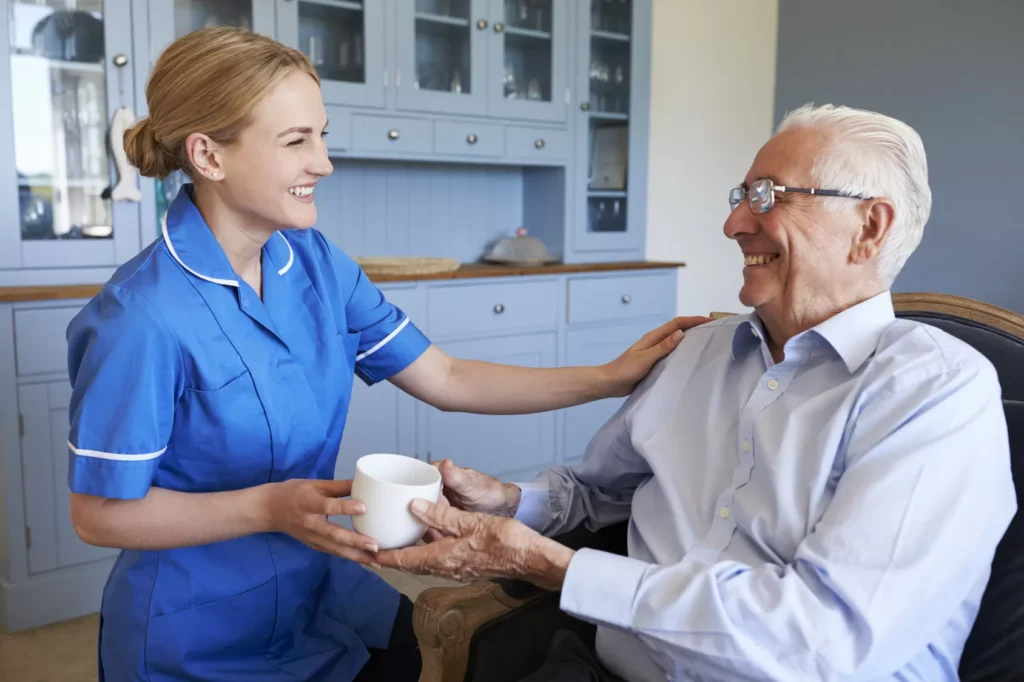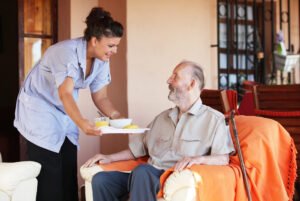There’s something sweetly comforting about home.
Home is where routines are familiar, memories are within reach, and everything—from the favorite armchair to the hallway floor—feels like it belongs. It’s where birthdays were celebrated, grandkids took their first steps, and generations gathered around the dinner table. Home holds more than just possessions—it holds meaning.
For many seniors, this sense of familiarity isn’t just comforting—it’s essential for their emotional and physical well-being. The smells, sounds, and structure of home create a sense of security that can’t easily be replicated elsewhere.
As families weigh care options—wondering whether to consider assisted living or relocate a loved one—one truth keeps rising to the surface: staying at home simply feels safer. But making it work requires more than good intentions. It takes thoughtful planning, consistent support, and the right kind of care to help seniors age with dignity in the place they love most.
Why Home Feels Safer
Emotional Security
Home isn’t just a physical place—it’s a living record of a life well-lived. It holds memories in every corner, from the sound of a favorite song playing in the kitchen to the worn armrest on a beloved chair. These familiar surroundings offer more than comfort for seniors—they provide emotional security.
Leaving home, even for a well-equipped facility, can feel like leaving behind a sense of self. It can bring on anxiety, sadness, or even a loss of confidence. In contrast, aging in place allows seniors to maintain their identity, routines, and sense of control. It enables them to wake up to a space that reflects their story, and that alone can do wonders for emotional and mental well-being.
Less Exposure to Illness
One of the major concerns for aging adults, especially in recent years, is exposure to illness in communal settings. Assisted living and nursing facilities, while helpful, often come with increased contact among residents, staff, and visitors, which raises the risk of infection.
Home care, on the other hand, offers a safer and more contained environment. With proper hygiene practices and limited exposure to outside contact, seniors can remain healthier and more protected in their own homes. During health emergencies like the COVID-19 pandemic, this became a deciding factor for many families prioritizing safety and stability.
Customized Routines
Every person has their own rhythm—when they prefer to wake up, how they enjoy their meals, what time they like to wind down. In structured care facilities, routines are standardized and often rigid, leaving little room for personal preferences.
But at home, life moves at the pace of the person living it. Seniors can enjoy their coffee slowly in their favorite mug, listen to the radio station they’ve loved for decades, or take a nap in the afternoon sun—all without the disruption of institutional schedules. This autonomy fosters not only happiness but also a stronger sense of dignity and agency in daily living.
How to Make Aging at Home Safe and Sustainable
Creating a safe, supportive environment at home doesn’t have to feel overwhelming. In fact, small, intentional changes combined with compassionate support can make a world of difference in helping your loved one thrive. Here are four key steps to ensure aging in place is not only possible but also sustainable and dignified:
1. Conduct a Home Safety Assessment
Start by walking through the home with fresh eyes. What may seem minor to you could pose a major risk to a senior with mobility or memory challenges. Look for fall hazards like loose rugs, uneven flooring, poor lighting, or cluttered hallways.
Install grab bars in bathrooms, add non-slip mats in the shower, and consider railings along stairways or ramps at entrances. Safety is not about making the home feel clinical. It’s about making it more livable, one thoughtful adjustment at a time.
2. Support Daily Needs with In-Home Care
Even the most independent seniors can benefit from a little extra help. Professional caregivers offer support with everyday tasks such as bathing, grooming, dressing, meal preparation, medication reminders, and light housekeeping.
More than that, they bring peace of mind. Knowing that someone is there to ensure routines are followed and health is monitored can ease family stress and prevent potential emergencies. It’s not about taking over. It’s about creating a reliable support system.
3. Encourage Social Connection
Emotional well-being is just as important as physical safety. As seniors age, loneliness and isolation can quietly increase, especially when mobility declines or loved ones live far away.
Encourage regular communication through phone calls, video chats, or safe in-person visits. Some families set up weekly check-ins or virtual coffee dates. Caregivers can also play a powerful role as daily companions, providing friendly conversation, emotional support, and genuine connection.
4. Use Technology Wisely
Technology can be a powerful tool for independence and safety. Tools like medication reminder apps, voice assistants, and motion-sensor lighting can make daily routines easier and safer.
You can also explore medical alert systems, smart doorbells, and wearable health devices. These tools not only enhance safety but also provide peace of mind for caregivers and family members. Technology should never replace care, but it can strengthen it.
Let’s Help Your Loved One Age with Dignity—At Home
At Ever Ready Home Care, we believe that staying home shouldn’t mean compromising safety, comfort, or dignity. In fact, with the right support system in place, home can be the safest, most empowering environment for aging adults. It’s where your loved one can continue living life at their own pace, surrounded by familiar sights, cherished memories, and the rhythms of a space that feels truly their own.
Whether your family is just beginning to explore care options or you’ve noticed signs that your loved one may need more support, know that you don’t have to navigate it alone. Our experienced and compassionate team is here to walk alongside you, offering guidance, personalized care solutions, and genuine peace of mind.
Let us help you create a plan that honors your loved one’s independence while ensuring their safety and well-being—right at home.
Ready to take the next step?
Schedule your free consultation today and discover how Ever Ready Home Care can support your family’s journey.



